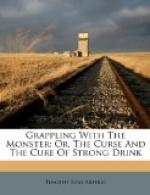“A further action upon the blood, instituted by alcohol in excess, is upon the fibrine or the plastic colloidal matter. On this the spirit may act in two different ways, according to the degree in which it affects the water that holds the fibrine in solution. It may fix the water with the fibrine, and thus destroy the power of coagulation; or it may extract the water so determinately as to produce coagulation.”
ON THE MINUTE CIRCULATION.
The doctor then goes on to describe the minute circulation through which the constructive material in the blood is distributed to every part of the body. “From this distribution of blood in these minute vessels,” he says, “the structure of organs derive their constituent parts; through these vessels brain matter, muscle, gland, membrane, are given out from the blood by a refined process of selection of material, which, up to this time, is only so far understood as to enable us to say that it exists. The minute and intermediate vessels are more intimately connected than any other part with the construction and with the function of the living matter of which the body is composed. Think you that this mechanism is left uncontrolled? No; the vessels, small as they are, are under distinct control. Infinitely refined in structure, they nevertheless have the power of contraction and dilatation, which power is governed by nervous action of a special kind.”
Now, there are certain chemical agents, which, by their action on the nerves, have the power to paralyze and relax these minute blood-vessels, at their extreme points. “The whole series of nitrates,” says Dr. Richardson, “possess this power; ether possesses it; but the great point I wish to bring forth is, that the substance we are specially dealing with, alcohol, possesses the self-same power. By this influence it produces all those peculiar effects which in every-day life are so frequently illustrated.”




